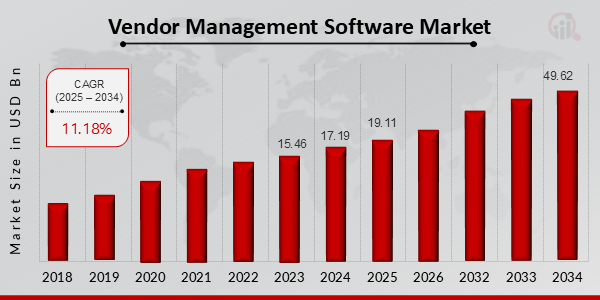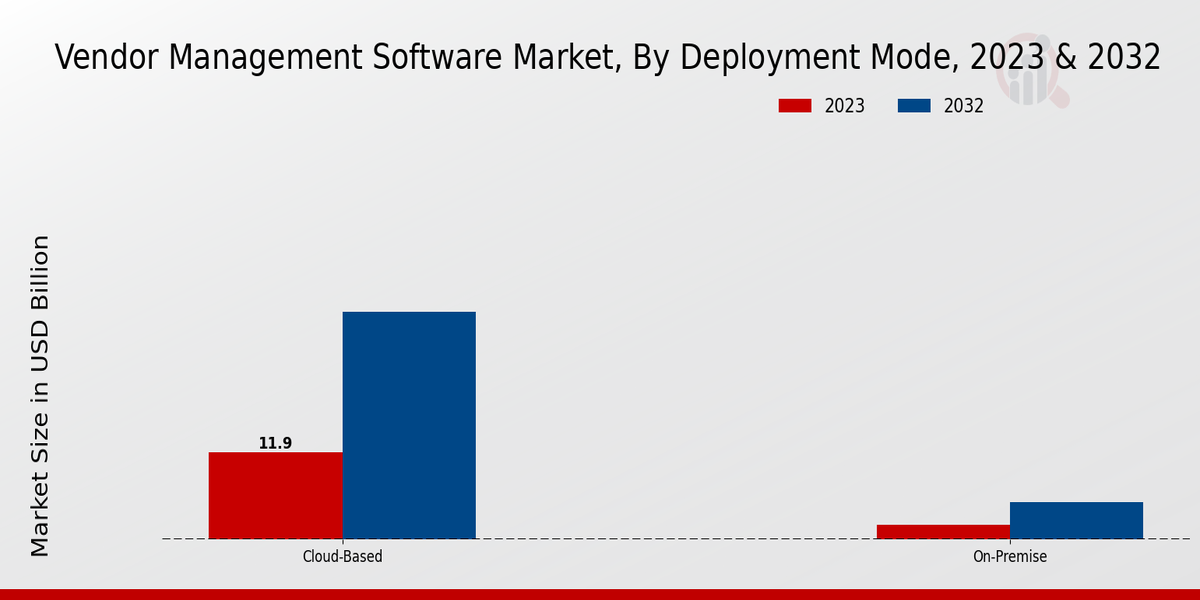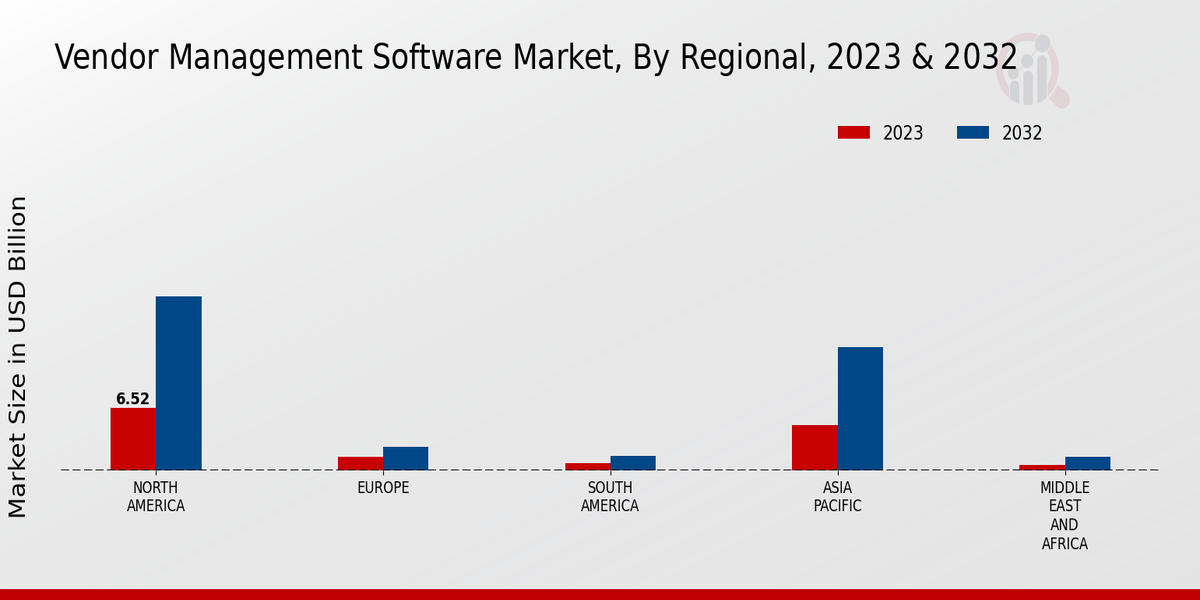Vendor Management Software Market Overview
Vendor Management Software Market is projected to grow from USD 19.11 Billion in 2025 to USD 49.62 Billion by 2034, exhibiting a compound annual growth rate (CAGR) of 11.18% during the forecast period (2025 - 2034).
Additionally, the market size for Vendor Management Software Market was valued at USD 17.19 billion in 2024.
Key Vendor Management Software Market Trends Highlighted
Rapid advancements in technology, the increasing complexity of supply chains, and the need for efficient vendor management are driving the growth of the vendor management software market. Organizations are leveraging these solutions to streamline vendor onboarding, performance monitoring, risk assessment, and contract management. Additionally, the rising adoption of cloud-based vendor management software is enabling businesses to access advanced features and enhance collaboration with vendors.
Key market trends include the growing emphasis on supplier diversity and inclusion, the increasing need for data analytics and reporting to improve vendor performance, and the adoption of artificial intelligence (AI) and machine learning (ML) to automate vendor management processes. These advancements are helping organizations gain better visibility, control, and efficiency in their vendor relationships.
Opportunities for growth in the vendor management software market lie in the expansion of vendor management solutions to include areas such as sustainability and environmental, social, and governance (ESG) compliance. The increasing adoption of vendor management software across industries is also creating new avenues for market expansion.
Figure 1: Vendor Management Software Market size 2025-2034

Source: Primary Research, Secondary Research, MRFR Database and Analyst Review
Vendor Management Software Market Drivers
Digital Transformation and Automation
Digital transformation is forcing organizations to enforce vendor management software to cater to their vendor management processes, which is further aiding operational functioning by automation vendor onboarding, identifying the performance, assessing the potential risk driving the overburdened procurement teams, and focusing on other strategic functions. Furthermore, as organizations are increasingly investing and adopting digitization into their supply chain and procurement, vendor management software is predicted to grow rapidly.
The Vendor Management Software Market Industry is forecast to grow from USD 13.9 billion in 2023 to USD 36.1 billion by 2032 at a Compound Annual Growth Rate of 11.18%. Furthermore, the growth is attributed to various drivers, which include the increasing momentum with respect to cloud-based solutions, the need to improve vendor performance, and the complexity of vendor relationships. Apart from this, government regulations and compliant requirements are other drivers of vendor management software, as organizations also want to ensure that vendors meet ethical and legal standards.
Increasing Vendor Complexity and Risk
The increasing complexity of vendor relationships represents a major challenge for organizations. In a constant endeavor to optimize their activity, companies outsource a growing share of their operations and employ an expanding number of vendors. However, many of the vendors provide similar services, while others offer extended but conflicting services. This leads organizations to make multiple decisional errors in assessing vendor capabilities, managing vendor performance, and mitigating vendor risks.Vendor management software represents a solution for overcoming the difficulty of working with a large number of vendors while tracking vendor performance and identifying and mitigating risks. Organizations can leverage vendor management software to streamline vendor management processes and reduce risks associated with vendor relationships.
Growing Need for Compliance and Governance
Continuous pressure is increasingly being felt by organizations in compliance with regulatory needs and industry standards. Vendor management software assists organizations in ensuring that their vendors meet compliance requirements and conform to ethical and legal standards. Owing to the tracking of vendor performance and identifying potential risks, organizations are able to minimize the risks usually associated with non-compliance and can thus be able to safeguard their name. Again, organizations benefiting from vendor management software are capable of generating reports and analytics for usage to show compliance with regulatory and industry standards.
Vendor Management Software Market Segment Insights
Vendor Management Software Market Deployment Mode Insights
The Vendor Management Software Market is segmented by deployment mode into cloud-based and on-premise. The cloud-based segment held a larger share of the market in 2023 and is expected to continue dominating throughout the forecast period. The reason for this is that cloud-based solutions are being adopted increasingly as they afford the user several benefits, such as flexibility, scalability, and cost savings. Additionally, on the vendor’s side of things, cloud-based vendor management software will eliminate the requirement for the infrastructure and maintenance of on-premise systems.
This means that they are a viable option for vendors of all sizes. Cloud-based solutions will also provide the user’s business with real-time visibility and control over the performance of their vendors, allowing greater insight into the effectiveness of those parties and aiding in decision-making. On the other hand, the on-premise deployment mode will experience a steady growth rate during the forecast period. This is because on-premise vendor management software is implemented to provide the user with a great deal of control and customization that cloud-based solutions cannot offer.
However, the limitations to this growth exist in the high costs associated with implementation and maintenance and the necessity for an in-house IT team. The Vendor Management Software Market is expected to experience considerable growth over the next few years. This is because of the increasing requirement for the management of vendors and the rise in the adoption of cloud-based solutions. Overall, there will be a number of other factors that contribute significantly, including the increasing complexity of relationships with vendors, the need for compliance and risk management, and the rise in the uptake of digital transformation initiatives.

Source: Primary Research, Secondary Research, MRFR Database and Analyst Review
Vendor Management Software Market Industry Vertical Insights
The Vendor Management Software Market segmentation by Industry Vertical includes BFSI, IT Telecom, Healthcare, Manufacturing, and Retail. BFSI is projected to have the largest market share due to the increase in the adoption of digital technologies and the increasing need to manage efficient vendor management to manage vast and complex vendor relationships and ensure compliance. Healthcare Is another significant segment due to the increased demand for applications that help manage the vendors related to the management of pre-delivery, medical equipment supply, pharmaceutical procurement, and healthcare IT services.IT Telecom, Manufacturing, and Retail are also anticipated to grow their Vendor Management Software Market revenue on account of growing demand for managing vendors for procurement, logistics, and supply chain for efficient Level 2 support for IT and Network Infrastructure.
Vendor Management Software Market Organization Size Insights
The Vendor Management Software Market segmentation by Organization Size includes Small and Medium-sized Enterprises (SMEs) and Large Enterprises. The market revenue for SMEs is projected to reach USD 10.4 billion by 2024, growing at a CAGR of 12.1%. SMEs are increasingly adopting vendor management software to streamline their operations and improve efficiency. Large Enterprises are also a significant segment, with a market revenue of USD 16.5 billion in 2024 and a projected CAGR of 10.8%. Large Enterprises are investing in vendor management software to manage their complex vendor ecosystems and improve risk management. The market growth for both segments are being driven by factors such as increasing globalization, growing regulatory compliance requirements, and the need for improved operational efficiency.
Vendor Management Software Market Functionality Insights
The Functionality segment plays a vital role in the Vendor Management Software market growth. It aids organizations in managing supplier relationships throughout their lifecycle, from onboarding to performance monitoring and risk assessment. In 2023, the Supplier Lifecycle Management module held the largest market share, valued at approximately USD 3.4 billion. The Performance Monitoring module is projected to exhibit the highest CAGR of 12.6% during the forecast period, reaching an estimated USD 6.1 billion by 2032. Risk Management and Compliance Management modules are also gaining traction, driven by increasing regulatory compliance requirements and the need to mitigate risks associated with third-party vendors. Spend Analysis, another key functionality, helps businesses optimize procurement spending and identify cost-saving opportunities.
Vendor Management Software Market End-User Type Insights
The Vendor Management Software Market is segmented by End-User Type into Procurement, Finance, Operations, and IT. Among these segments, Procurement held the largest market share in 2023 and is expected to continue its dominance throughout the forecast period. The growth of this segment can be attributed to the increasing need for organizations to manage their supplier relationships effectively. Vendor management software helps organizations streamline their procurement processes, improve supplier performance, and reduce costs. Finance is another significant segment in the Vendor Management Software Market.
This segment is expected to witness steady growth over the forecast period due to the increasing adoption of vendor management software by finance departments. Vendor management software helps finance departments to automate their vendor payment processes, improve vendor invoice accuracy, and reduce fraud.
Vendor Management Software Market Regional Insights
The Vendor Management Software Market is expected to reach a value of USD 36.1 billion by 2032, exhibiting a CAGR of 11.18% during the forecast period. Regionally, North America held the largest market share in 2023 and is expected to maintain its dominance throughout the forecast period. The growth in this region can be attributed to the presence of a large number of vendors and the increasing adoption of vendor management software by enterprises to improve their supply chain efficiency. Europe is another significant market for vendor management software, with a number of countries in the region having mature vendor management practices.
The APAC region is expected to witness the fastest growth in the vendor management software market over the forecast period due to the increasing adoption of digital technologies and the growing awareness of vendor management best practices among enterprises in the region. South America and MEA are also expected to experience steady growth in the vendor management software market as enterprises in these regions look to improve their vendor management capabilities.

Source: Primary Research, Secondary Research, MRFR Database and Analyst Review
Vendor Management Software Market Key Players and Competitive Insights
Major players in the Vendor Management Software Market industry are continuously focusing on expanding their product portfolios by introducing innovative solutions and features. Leading Vendor Management Software Market players are actively involved in strategic partnerships, collaborations, and acquisitions to strengthen their market presence and gain a competitive edge. The Vendor Management Software Market development is primarily driven by the increasing need for organizations to improve vendor management processes. Marketers are focusing on offering cloud-based solutions to cater to the growing demand for flexibility and scalability.
A leading company in the Vendor Management Software Market, SAP offers a comprehensive suite of vendor management solutions designed to help organizations manage their vendor relationships effectively. SAP's solutions provide organizations with real-time visibility into vendor performance, enabling them to identify and mitigate risks, improve collaboration, and optimize costs. SAP's commitment to innovation and customer satisfaction has positioned it as a leading player in the Vendor Management Software Market.Oracle, a competitor in the Vendor Management Software Market, offers a range of vendor management solutions that help organizations automate vendor management processes, improve compliance, and reduce costs. Oracle's solutions provide organizations with a centralized platform to manage vendor contracts, track performance, and assess risk. Oracle's focus on cloud-based solutions and its commitment to providing innovative products and services have made it a formidable competitor in the Vendor Management Software Market.
Key Companies in the Vendor Management Software Market Include
- Empronc Solutions, Inc.
- GEP (Global eProcure)
- Oracle Corporation
- Kissflow Technologies Inc.
- Coupa Software
- Zycus, Inc.
- IBM Corporation
- Determine, Inc.
- SAP SE
- Ivalua, Inc.
- BravoSolution
- Keelvar
Vendor Management Software Market Industry Developments
The Vendor Management Software market has witnessed significant growth in recent years, driven by the increasing need for businesses to manage their vendor relationships effectively. This growth is expected to continue in the coming years, with the market projected to reach a value of USD 13.9 billion by 2023 and USD 36.1 billion by 2032, exhibiting a CAGR of 11.18% during the forecast period (2024-2032).
Key factors contributing to this growth include the rising complexity of vendor relationships, the need for improved compliance and risk management, and the increasing adoption of digital technologies in procurement processes. The market is also being driven by the growing demand for cloud-based vendor management solutions, which offer greater flexibility, scalability, and cost-effectiveness.
Vendor Management Software Market Segmentation Insights
-
Vendor Management Software Market Deployment Mode Outlook
-
Vendor Management Software Market Industry Vertical Outlook
- BFSI
- IT Telecom
- Healthcare
- Manufacturing
- Retail
-
Vendor Management Software Market Organization Size Outlook
- Small and Medium-sized Enterprises (SMEs)
- Large Enterprises
-
Vendor Management Software Market Functionality Outlook
- Supplier Lifecycle Management
- Performance Monitoring
- Risk Management
- Compliance Management
- Spend Analysis
-
Vendor Management Software Market End-User Type Outlook
- Procurement
- Finance
- Operations
- IT
-
Vendor Management Software Market Regional Outlook
-
North America
-
Europe
-
South America
-
Asia Pacific
-
Middle East and Africa
|
Report Attribute/Metric
|
Details
|
|
Market Size 2024
|
17.19 (USD Billion)
|
|
Market Size 2025
|
19.11 (USD Billion)
|
|
Market Size 2034
|
49.62 (USD Billion)
|
|
Compound Annual Growth Rate (CAGR)
|
11.18% (2025 - 2034)
|
|
Report Coverage
|
Revenue Forecast, Competitive Landscape, Growth Factors, and Trends
|
|
Base Year
|
2024
|
|
Market Forecast Period
|
2025 - 2034
|
|
Historical Data
|
2019 - 2023
|
|
Market Forecast Units
|
USD Billion
|
| Key Companies Profiled |
Empronc Solutions, Inc., GEP (Global eProcure), Oracle Corporation, Kissflow Technologies Inc., Coupa Software, Zycus, Inc., IBM Corporation, Determine, Inc., SAP SE, Ivalua, Inc., BravoSolution, Keelvar |
| Segments Covered |
Deployment Mode, Industry Vertical, Organization Size, Functionality, End-User Type, Regional |
| Key Market Opportunities |
Increasing adoption of cloud-based solutions Growing need for vendor consolidation Rising demand for risk and compliance management AI-powered vendor performance optimization Automation of vendor management processes |
| Key Market Dynamics |
Increased demand for cloud-based solutions Growing need for vendor risk management Digitization in the supply chain |
| Countries Covered |
North America, Europe, APAC, South America, MEA |
Frequently Asked Questions (FAQ) :
The Vendor Management Software Market was valued at USD 13.9 billion in 2023 and is expected to reach USD
49.62 billion by 2034, exhibiting a CAGR of 11.18% during the forecast period.
North America is expected to hold the largest market share in the Vendor Management Software Market, owing to the early adoption of advanced technologies and the presence of a large number of established vendors.
The IT and Telecom segment is expected to witness the highest growth rate in the Vendor Management Software Market due to the increasing adoption of cloud-based solutions and the need for effective vendor management in the IT industry.
Key competitors in the Vendor Management Software Market include SAP SE, Oracle Corporation, IBM Corporation, Coupa Software Incorporated, and Determine, Inc.
Key trends shaping the Vendor Management Software Market include the adoption of artificial intelligence (AI), the rise of cloud-based solutions, and the increasing focus on vendor risk management.
Challenges faced by the Vendor Management Software Market include data integration issues, lack of vendor management expertise, and security concerns.
Growth opportunities in the Vendor Management Software Market include the expansion into emerging markets, the development of new applications, and the integration of new technologies.
The competitive landscape of the Vendor Management Software Market is fragmented, with a number of established vendors and emerging players. The market is characterized by a high level of innovation and a focus on customer satisfaction.
Key factors driving the growth of the Vendor Management Software Market include the increasing need for vendor management, the adoption of cloud-based solutions, and the growing awareness of vendor risks.
Key trends and developments in the Vendor Management Software Market include the integration of artificial intelligence (AI), the rise of blockchain technology, and the increasing focus on vendor performance management.





























